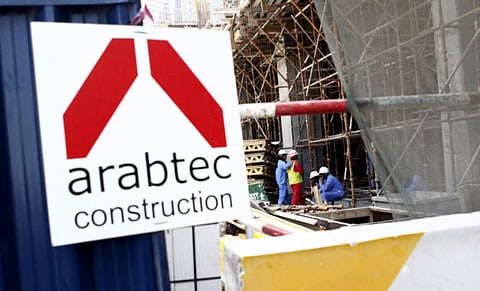Arabtec net profit jumps 121% to Dh138 million
Results buoyed by growing business in Gulf, strong projects delivery

Dubai: Arabtec Holding, the builder of the world’s tallest building, the Burj Khalifa, on Wednesday reported a net profit of Dh138 million for the first quarter of 2014, a 121 per cent jump from a year ago.
The revenues of Dubai’s largest listed construction company went up by 39 per cent, from Dh1.545 billion to Dh2.152 billion on the back of Arabtec’s growing business in the Gulf. The first three months of the year also witnessed a 15 per cent growth in the gross profit margin and a 7 per cent increase in net profit margin.
Hasan Ismaik, managing director and CEO of Arabtec Holding, attributed the company’s positive performance to their expanding operations and stronger delivery of projects in the region.
“We continued to achieve high growth in profits and revenues, driven by our growing business in the UAE and the region, and more focus on delivery and profitability of projects,” Ismaik said in a statement.
Mansoor Ahmed, director for development solutions at Colliers International, said Arabtec’s strong financial results clearly reflect the recovery of Dubai’s property sector. However, he said, while real estate prices in Dubai are already stabilizing, developers should also focus on the construction of housing projects for the middle-income segment, where there is a huge demand for affordable residential units.
“Arabtec’s results only show that the market is doing well. This is a healthy sign, but our concern is that there is too much focus right now on projects targeting the high-income clients. Developers should also concentrate on the mid-income segment,” Ahmed told Gulf News in a phone interview.
Arabtec’s portfolio includes popular landmarks in the UAE, such as Burj Khalifa in Dubai and the Emirates Palace in Abu Dhabi. The company was the first private construction firm to go public when it debuted on the Dubai Financial Market in 2005.
“Arabtec is one of the premier contractors in the region and the upsurge in the UAE real estate market has added significant value to their order book,” said Imran Shaikh, CEO of real estate development company Shaikh Holdings. “Arabtec’s success will continue due to its diversification strategy into high value sectors such as oil and gas and infrastructure, and new acquisitions allowing it further expansion into international markets.”
Phenomenal
Paul Preston, director and head of Middle East, IP Global, said the results are phenomenal and underpin Dubai’s strong recovery. “The record profits relate really to construction activity. The projects that were put on hold through 2008 – 2012 have now restarted which had a direct effect into construction companies and contractors alike,” Preston said.
“There is a clear demand for quality housing in Dubai and some properties grew 45 per cent in value through 2013 year on year, which shows a market that is full of confidence and activity.” The demand, Preston added, does not only come from investors but also from job growth in Dubai over the past year.
“However, we do have to be careful that prices don’t get too strong, slowing down the demand which will in turn result in the slowdown of construction, like [what happened] in 2007,” Preston said.
In the first quarter of the year, Arabtec won Dh26.2 billion worth of contracts, representing a growth of 28 per cent over the Dh20.4 billion registered a year ago.
The company’s implied total direct and indirect value of projects by the end of the first quarter went up to Dh215 billion, which includes Dh26.2 billion worth of ongoing projects.
Also in the same period, the company secured deals for the construction of various projects, including the 36 towers in Abu Dhabi for Dh21.8 billion and the Red Sea Astrarium in Aqaba, Jordan for Dh5.7 billion.
Arabtec’s pipeline also includes the construction of one million housing units in Egypt for Dh147 bilion and other property development projects unveiled at the recent Cityscape worth Dh14 billion.
The first three months of the year witnessed Arabtec launching five new subsidiaries, in a bid to reach out to new sectors. Two subsidiaries will oversee infrastructure projects inside and outside the UAE, while another subsidiary will focus on property development. The other two will be into the education and training of nationals in construction-related disciplines and financial services.
Sign up for the Daily Briefing
Get the latest news and updates straight to your inbox



